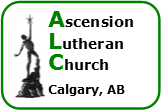Fourth Sunday in Advent
Matthew 1:18-25
[18] Now the birth of Jesus the Messiah took place in this way. When his mother Mary had been engaged to Joseph, but before they lived together, she was found to be with child from the Holy Spirit. [19] Her husband Joseph, being a righteous man and unwilling to expose her to public disgrace, planned to dismiss her quietly. [20] But just when he had resolved to do this, an angel of the Lord appeared to him in a dream and said, “Joseph, son of David, do not be afraid to take Mary as your wife, for the child conceived in her is from the Holy Spirit. [21] She will bear a son, and you are to name him Jesus, for he will save his people from their sins.” [22] All this took place to fulfill what had been spoken by the Lord through the prophet:
[23] “Look, the virgin shall conceive and bear a son, and they shall name him Emmanuel,”
which means, “God is with us.” [24] When Joseph awoke from sleep, he did as the angel of the Lord commanded him; he took her as his wife, [25] but had no marital relations with her until she had borne a son; and he named him Jesus.
Joseph had already made up his mind what to do when the angel of the Lord appeared to him in a dream. The decision to dismiss Mary quietly seemed the best option in a bad situation. From Joseph’s perspective it was foolishness to marry someone who had been unfaithful, yet he still cared enough for Mary and her family to do what he could to spare them undue pain and humiliation.
So it isn’t surprising that the angel’s message began with the phrase “do not be afraid”. The command was not just about the angelic appearance (which would have been unnerving enough) but about the message to take Mary for his wife, contrary to his best and gracious reasoning. It is noteworthy that Joseph did as the angel had commanded (for he certainly could have done otherwise). Joseph willingly set aside his own fears and misgivings about Mary and their relationship in favour of trusting more in God’s word and promises. Joseph’s actions didn’t mean all his doubts and fears magically disappeared with the angel’s appearance. Rather, it demonstrated that he trusted more in God’s love for him and Mary, than he did in his own fearful speculations about what might happen if he took Mary for his wife.
God’s promise of love doesn’t mean we will be exempt from each and every fearful circumstance in life (read the rest of Mathew 2 and you’ll see there was more in store for Joseph and his little family). It does mean that if we’ll receive it, God’s love and peace is greater than our fears—freeing us to live in his grace.
